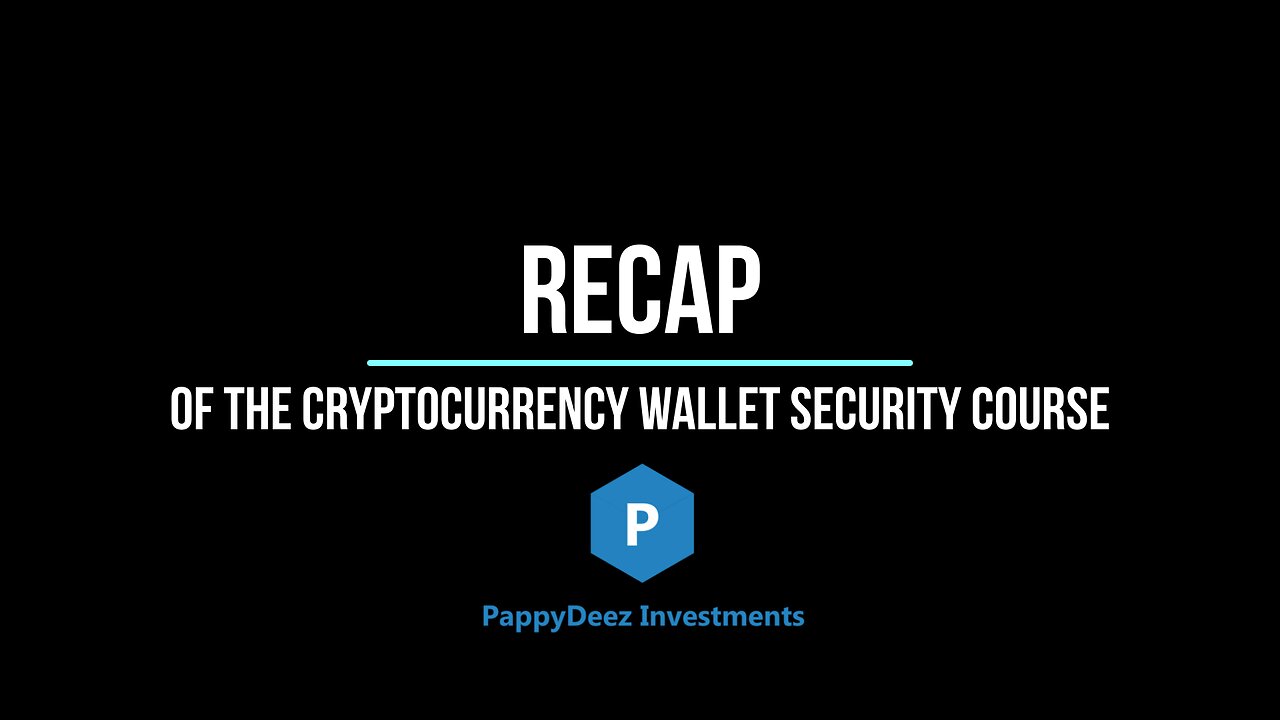Premium Only Content

A Recap Of the Cryptocurrency Wallet Security Course
Let's Recap What We Have Covered So Far...
Securing the Cryptocurrency Computer
Is my cryptocurrency computer safe as long as I run anti-virus and anti-spyware software on it?
Yes, but only partly...
For the highest level of security while using your computer, you must login with Standard credentials, NOT Administrative credentials!
Securing Email Accounts
Is my Gmail account secure enough, to use as a login for my cryptocurrency exchange account?
Gmail is a popular email service, but it does not encrypt your emails end to end, and is often the target of hacking attacks.
For the highest level of email security, use an email service which encrypts your emails, such as Protonmail.
Email services, such as Gmail are fine for temporary sign-ups, where you assume that your inbox will be flooded with spam emails.
Using Password Managers
Where should my passwords be saved?
a) On a post-it note.
b) Stored in my brain.
c) Nowhere, I just use my SSN.
d) Secured by an encrypted password manager.
Secured by an encrypted password manager.
Passwords written on scraps of paper or in easily accessible locations, are clearly insecure.
Memorizing your passwords may be fine when you are young, but time and declining mental capacity, may cause you to forget your passwords.
Using easily discovered passwords like phone numbers, SSN, birth dates, pet’s names, etc. are clearly insecure passwords.
An encrypted password manager is one of the best methods of managing many different account passwords. With only the need to remember one password that accesses the password manager itself.
Using Two Factor Authentication
If your email app, bank app, or cryptocurrency exchange offers two factor authentication, for accessing the site, it would be best practice to make use of this feature. It will help prevent unauthorized people from accessing your accounts.
Cryptocurrency Wallet Basics
Your cryptocurrency coins and tokens are stored...
a) In my cryptocurrency wallet.
b) On my computer.
c) On the blockchain mainnet of the individual coin.
On the blockchain mainnet of the individual coin.
Your coins do not exist in your wallet. They only exist on the coin’s blockchain mainnet. They are nothing more than blocks containing the transactional information that you have made with your wallet. Essentially, that are ledger entries existing on a network of computer nodes that support the blockchain network of the coin you hold.
What's In My Cryptocurrency Wallet?
Your cryptocurrency wallet only contains the private key information, which allows it to unlock the transaction information on the blockchain. It can only access the blocks of the blockchain that are associated with those keys. The private keys are require to authorize a send transaction from the wallet.
Differences Between Custodial & Non-Custodial or Self-Custodial Wallets
True or False,
When using a Custodial wallet, I have full control of that wallet's Private Keys.
FALSE
A custodial wallet is a wallet that is held by a 3rd party, like your cryptocurrency exchange wallet or the wallet used by your broker to hold your coins.
A custodial wallet requires you to trust the 3rd party to handle your cryptocurrencies in an honest fashion.
A non-custodial or self-custodial wallet is a wallet that you have full control over.
You control the private keys. You are responsible for any actions taken with the coins or tokens held by the wallet.
Which is Better, A Software Wallet or a Hardware Wallet?
Which type of wallet should I choose?
a) Software wallet
b) Hardware wallet
c) Smartphone app
d) Paper or metal wallet
e) All of the above
f) None of the above
Whatever you are most comfortable with.
It must be your choice!
Each wallet type has its advantages, disadvantages and inherent risks. Be aware of what they are and how to handle them.
But, if you are looking for an ‘all around’ solution, then a software wallet secured by a hardware device will give the security of a hardware device with the convenience of a software wallet.
For example, an Exodus wallet secured by a Trezor device.
Securing the Mnemonic Backup Phrase
Which component of the cryptocurrency wallet system, is the most important?
a) Cryptocurrency wallet
b) Cryptocurrency computer.
c) Mnemonic backup or seed phrase
Mnemonic Backup or Seed Phrase
Your mnemonic backup or seed phrase is the most important component of your cryptocurrency wallet system. You can lose your computer and still restore the wallet applications to a new computer. You can lose your wallet, and as long as you have your mnemonic seed phrase, you will be able to re-create the private keys on any compatible wallet and restore your connection to your cryptocurrency assets.
Coming Soon, Advanced Techniques:
• For Securing Your Password Manager
• Using a Yubikey Device to Secure Applications
• Using Hidden Wallets on Trezor and Ledger Devices
• Storing the Mnemonic Backup on a Stainless Steel Case
• Using the Shamir Backup with the Trezor Model T
• Creating Shamir Shares From a 12 to 24 Word Mnemonic Backup
• + Tips for Avoiding Scams and Phishing Attempts
-
 1:12:46
1:12:46
Candace Show Podcast
2 hours agoCharlie Ripped A Hole In Reality | Candace Ep 253
35.1K63 -
 UPCOMING
UPCOMING
Tundra Tactical
3 hours agoProfessional Gun Nerd Plays Battlefield 6
131 -
 LIVE
LIVE
NAG Daily
21 minutes agoBOLDCHAT: with ANGELA BELCAMINO
20 watching -
 LIVE
LIVE
Blabs Games
7 hours agoFirst Time Playing Jurassic World Evolution 3
58 watching -
 LIVE
LIVE
The Rabble Wrangler
19 hours agoBattlefield 6 - RedSec with The Best in the West
35 watching -
 LIVE
LIVE
Viss
9 hours ago🔴LIVE - BF6 Battle Royale Launch: RedSec w/ Viss, Dr Disrespect, BobbyPoff, Rallied
92 watching -
 1:51:08
1:51:08
Redacted News
3 hours agoWhat are they hiding? New evidence in Charlie Kirk’s shooting shakes up the case | Redacted
116K89 -
 LIVE
LIVE
Red Pill News
4 hours agoDOJ Investigation of Autopen Orders Begins on Red Pill News Live
3,781 watching -
 1:08:20
1:08:20
vivafrei
6 hours agoDoug Ford's Tour of Shame! Ed Markey's Self Own! Biden's Autopen Scandal is BAD! AND MORE!
108K26 -
 1:08:34
1:08:34
DeVory Darkins
6 hours agoDHS announces Major SHAKE UP as Air Traffic Controllers drop ULTIMATUM for Congress
153K102